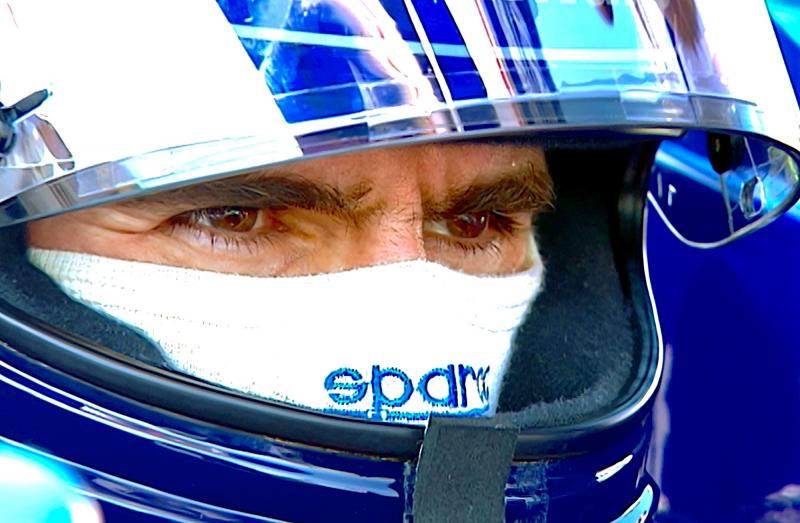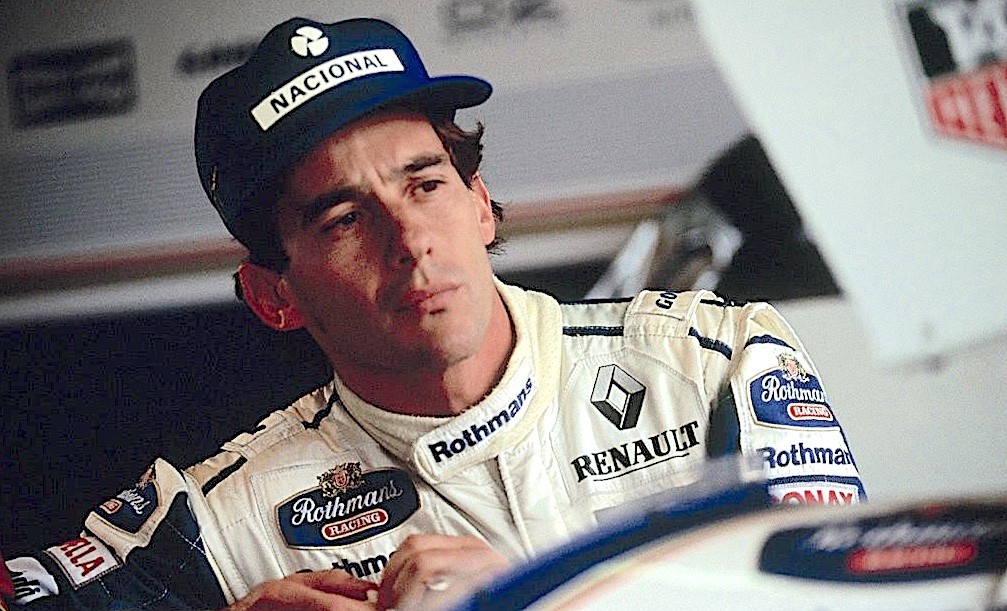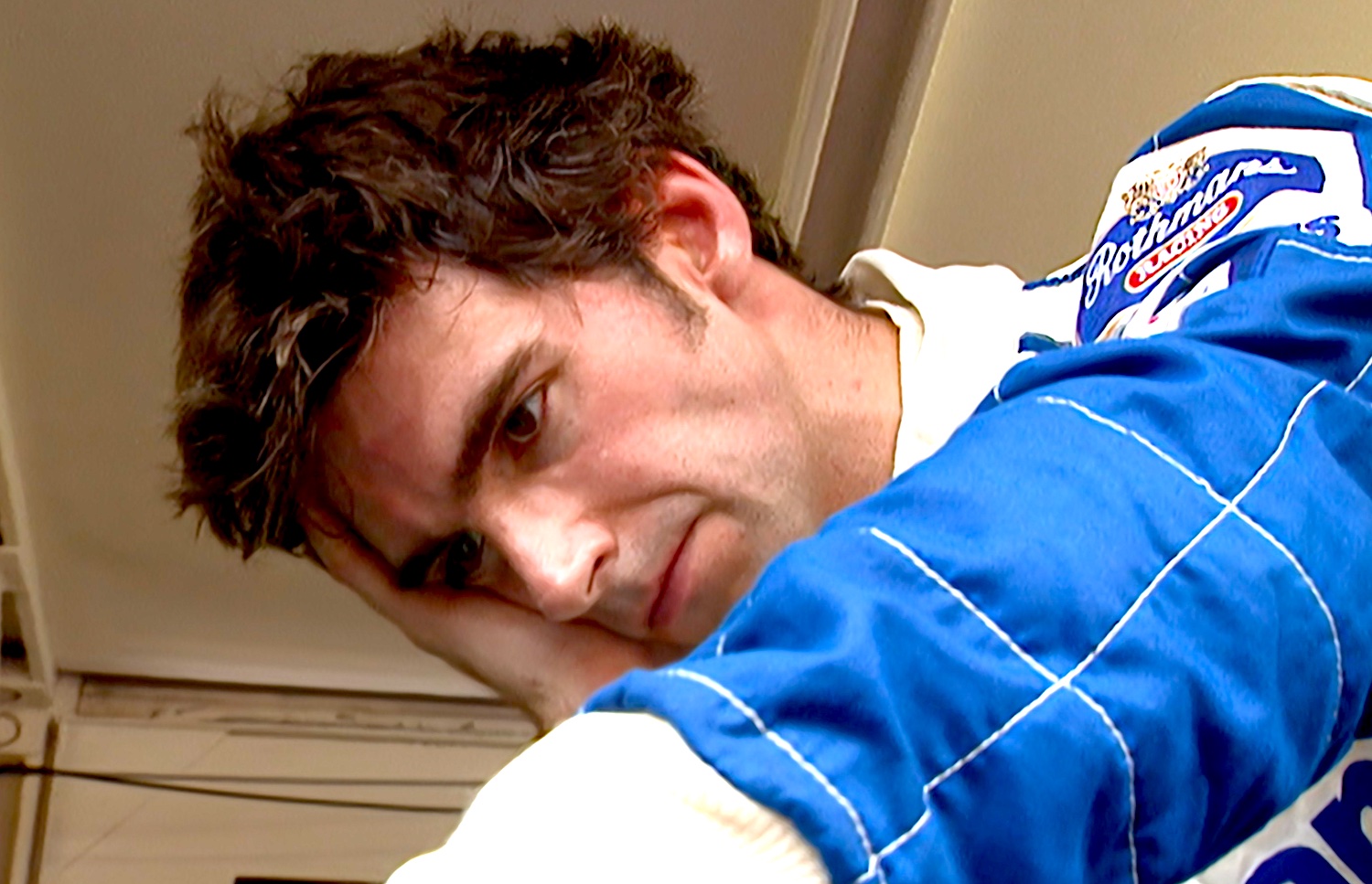Hill, Sky Documentaries review - how Damon Hill battled his demons | reviews, news & interviews
Hill, Sky Documentaries review - how Damon Hill battled his demons
Hill, Sky Documentaries review - how Damon Hill battled his demons
Alex Holmes's film is both documentary and psychological portrait

Some world champion racing drivers make it look effortless, but it was never that way for Damon Hill. His path to the championship he won in 1996 had been fraught with difficulties, including not just his increasingly ill-tempered on-track battle with Michael Schumacher, but also the sometimes less-than-wholehearted support he received from the Williams team. Indeed, the team had already announced they were replacing him before he won the 1996 title.
Director Alex Holmes’s film often resembles a therapy session rather than a traditional documentary, with Hill sitting on a darkened set in front of the camera and ruminating on his life and career. He enjoyed an idyllic childhood as the son of the charismatic Graham Hill, a two-times world champion who loved the limelight and was a natural party animal and crowd-pleaser, but his father’s death in an air crash in 1975 when Damon was 15 was a trauma which he seems never to have fully recovered from. He still clearly remembers the ghastly night when news of Graham’s accident broke, and the hysterical reaction of his mother.
The bleak irony was that the disaster occurred after Graham had survived the notoriously dangerous years of his racing career in the Sixties and Seventies, when he’d seen the last of many friends and colleagues. For his family, the anguish of his death was compounded by the fact that the aeroplane he was flying in had been unregistered and uninsured, which meant that his wife and kids lost all his estate as well as the family home.
 As Damon recalls in this sometimes painfully emotional documentary, after his teenage life went “horribly to pieces”, it was as if “the rest of my life has been spent trying to put it back together again… but you can’t go back to fix it, that’s the bottom line.” Had his father not died it seems likely that Damon would never have become a racing driver at all, though he had a teenage fixation with motorbikes, but following Graham’s career seemed like a way of somehow coming to terms with the past.
As Damon recalls in this sometimes painfully emotional documentary, after his teenage life went “horribly to pieces”, it was as if “the rest of my life has been spent trying to put it back together again… but you can’t go back to fix it, that’s the bottom line.” Had his father not died it seems likely that Damon would never have become a racing driver at all, though he had a teenage fixation with motorbikes, but following Graham’s career seemed like a way of somehow coming to terms with the past.
Holmes’s film is as far removed from the wall-to-wall spectacular of Brad Pitt’s F1 movie as it’s possible to get, but it’s all the stronger for it. Hill’s contributions are balanced against interviews with his wife Georgie, who brings great insight and a kind of philosophical calm to the proceedings. When she first met him she instinctively understood that they were made for each other, despite that fact that Damon was battling some persistent demons. “He was one of the saddest people I’ve ever come across in my life,” she recalls. But she also remembers feeling that “I’ll be absolutely OK with him, because I think he understood something about life that most of the people around me at the time had no understanding of.”
A striking trademark is the way the film conforms to the old-fashioned non-widescreen 4:3 ratio, a natural fit for the copious archive footage covering Damon’s racing career as well as the priceless home-movie material from the Hill family’s vault. A gallery of famous names passes in front of the camera, including ace drivers Prost, Mansell and Ayrton Senna (pictured above) as well as the bumptious Schumacher, while some intriguing light is shone on the inner workings of Williams. Under Frank Williams and his partner Patrick Head, the team seems to have been run a bit like one of the more spartan of Britain’s public schools, where everyone had to know their place and not cheek the headmaster. There’s a revealing home-movie clip of Georgie reading Damon’s contract with Williams as it emerges from the fax machine, and she’s aghast that Damon will be expected to pay his own travel expenses.
 The team was somehow never quite 100 per cent behind Damon, and when Williams recalled their former champ Nigel Mansell after the catastrophic death of Senna in 1994, Hill felt he was being undercut. “It seemed to me to be a vote of no confidence,” he remarks ruefully. But if Hill could be erratic, as in his patchy 1995 season when he admits he allowed Schumacher to get under his skin, he could also perform brilliantly, as he did in 1994 and in his triumphant 1996 campaign. Of course, we hear again Murray Walker’s emotional commentary as Hill crosses the line in Japan as world champion – “I’ve got to stop because I’ve got a lump in my throat.” As for Hill, he reckons the film is “a weepy with a happy ending.”
The team was somehow never quite 100 per cent behind Damon, and when Williams recalled their former champ Nigel Mansell after the catastrophic death of Senna in 1994, Hill felt he was being undercut. “It seemed to me to be a vote of no confidence,” he remarks ruefully. But if Hill could be erratic, as in his patchy 1995 season when he admits he allowed Schumacher to get under his skin, he could also perform brilliantly, as he did in 1994 and in his triumphant 1996 campaign. Of course, we hear again Murray Walker’s emotional commentary as Hill crosses the line in Japan as world champion – “I’ve got to stop because I’ve got a lump in my throat.” As for Hill, he reckons the film is “a weepy with a happy ending.”
The future of Arts Journalism
You can stop theartsdesk.com closing!
We urgently need financing to survive. Our fundraising drive has thus far raised £49,000 but we need to reach £100,000 or we will be forced to close. Please contribute here: https://gofund.me/c3f6033d
And if you can forward this information to anyone who might assist, we’d be grateful.

Subscribe to theartsdesk.com
Thank you for continuing to read our work on theartsdesk.com. For unlimited access to every article in its entirety, including our archive of more than 15,000 pieces, we're asking for £5 per month or £40 per year. We feel it's a very good deal, and hope you do too.
To take a subscription now simply click here.
And if you're looking for that extra gift for a friend or family member, why not treat them to a theartsdesk.com gift subscription?
more TV
 In Flight, Channel 4 review - drugs, thugs and Bulgarian gangsters
Katherine Kelly's flight attendant is battling a sea of troubles
In Flight, Channel 4 review - drugs, thugs and Bulgarian gangsters
Katherine Kelly's flight attendant is battling a sea of troubles
 Alien: Earth, Disney+ review - was this interstellar journey really necessary?
Noah Hawley's lavish sci-fi series brings Ridley Scott's monster back home
Alien: Earth, Disney+ review - was this interstellar journey really necessary?
Noah Hawley's lavish sci-fi series brings Ridley Scott's monster back home
 The Count of Monte Cristo, U&Drama review - silly telly for the silly season
Umpteenth incarnation of the Alexandre Dumas novel is no better than it should be
The Count of Monte Cristo, U&Drama review - silly telly for the silly season
Umpteenth incarnation of the Alexandre Dumas novel is no better than it should be
 The Narrow Road to the Deep North, BBC One review - love, death and hell on the Burma railway
Richard Flanagan's prize-winning novel becomes a gruelling TV series
The Narrow Road to the Deep North, BBC One review - love, death and hell on the Burma railway
Richard Flanagan's prize-winning novel becomes a gruelling TV series
 The Waterfront, Netflix review - fish, drugs and rock'n'roll
Kevin Williamson's Carolinas crime saga makes addictive viewing
The Waterfront, Netflix review - fish, drugs and rock'n'roll
Kevin Williamson's Carolinas crime saga makes addictive viewing
 theartsdesk Q&A: writer and actor Mark Gatiss on 'Bookish'
The multi-talented performer ponders storytelling, crime and retiring to run a bookshop
theartsdesk Q&A: writer and actor Mark Gatiss on 'Bookish'
The multi-talented performer ponders storytelling, crime and retiring to run a bookshop
 Ballard, Prime Video review - there's something rotten in the LAPD
Persuasive dramatisation of Michael Connelly's female detective
Ballard, Prime Video review - there's something rotten in the LAPD
Persuasive dramatisation of Michael Connelly's female detective
 Bookish, U&Alibi review - sleuthing and skulduggery in a bomb-battered London
Mark Gatiss's crime drama mixes period atmosphere with crafty clues
Bookish, U&Alibi review - sleuthing and skulduggery in a bomb-battered London
Mark Gatiss's crime drama mixes period atmosphere with crafty clues
 Too Much, Netflix - a romcom that's oversexed, and over here
Lena Dunham's new series presents an England it's often hard to recognise
Too Much, Netflix - a romcom that's oversexed, and over here
Lena Dunham's new series presents an England it's often hard to recognise
 Insomnia, Channel 5 review - a chronicle of deaths foretold
Sarah Pinborough's psychological thriller is cluttered but compelling
Insomnia, Channel 5 review - a chronicle of deaths foretold
Sarah Pinborough's psychological thriller is cluttered but compelling
 Live Aid at 40: When Rock'n'Roll Took on the World, BBC Two review - how Bob Geldof led pop's battle against Ethiopian famine
When wackily-dressed pop stars banded together to give a little help to the helpless
Live Aid at 40: When Rock'n'Roll Took on the World, BBC Two review - how Bob Geldof led pop's battle against Ethiopian famine
When wackily-dressed pop stars banded together to give a little help to the helpless
 Hill, Sky Documentaries review - how Damon Hill battled his demons
Alex Holmes's film is both documentary and psychological portrait
Hill, Sky Documentaries review - how Damon Hill battled his demons
Alex Holmes's film is both documentary and psychological portrait

Add comment